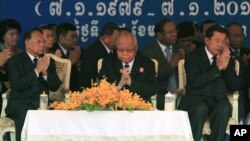WASHINGTON DC - Jan. 7 is typically a divisive day in Cambodia, splitting the country between those who support the Vietnamese ousting of the Khmer Rouge on that day in 1979, and those who see it as the beginning of a decade-long occupation of Cambodia. But a leading analyst says the bitter divide found among the older generation, including politicians, has lost some of its impact with Cambodian youths.
The Jan. 7 anniversary is also used in politics, and in an election year like this one even more so. But Ou Virak, head of the Cambodian Center for Human Rights, told “Hello VOA” on Monday that these are “old school” tactics that may not work on the growing ranks of young voters.
As the ruling Cambodian People’s Party uses the day to remind voters that they are now free from the horrors of the Khmer Rouge, the opposition uses the day to remind them that the communist government of Vietnam installed today’s Cambodian leaders, and they claim that illegal Vietnamese immigration is a threat to Cambodians.
Ou Virak said this is unfair, however, and weakens the opposition in the eyes of the international community, who could view such tactics as racism.
To the younger voters, Jan. 7, 1979, is a day far gone in history, and it is not understood well. On that day, Vietnamese-led forces and Cambodian fighters entered the capital, ousting the Khmer Rouge, which had been in power since April 15, 1975.
“They will not remember, because they were not born,” Ou Virak said. “Even if they had been born, they would not remember. Mostly, they did not live directly under the Khmer Rouge regime.”
Thirty-four years later, the anniversary should no longer divide Cambodians, he said. “It causes Cambodians to be fragile, and to be unable to talk about pressing issues, and unable to develop our country,” he said.
Younger voters are more likely to be interested in the country’s future, and for change, he said. “They can change the destiny of the country, if they are involved in the election coming in July,” he said, adding that the lack of participation was another issue to be addressed.
Other concerns of the youth are the country’s dignity and reputation, and its development, more so that with the older generation, which survived the Khmer Rogue and the civil strife that followed its collapse.
However, Koul Panha, executive director of the Committee for Free and Fair Elections, said the older generation could still be passing on their views to their children. “If the parents support the Jan. 7 day, they will explain its necessity,” he said. “And for those who have opposite ideas about Vietnam, they will explain it to their children as an invasion, and so on.”
Ou Virak said the day should be remembered, but not as a day that brought peace to Cambodia. Civil war followed, as the Khmer Rouge continued its resistance to Vietnamese forces, along with other factions. And it was not the CPP alone that liberated the country, it was many Cambodians, he said.
Jan. 7 Less Divisive Amid Cambodian Youth
- Sok Khemara
- VOA Khmer





